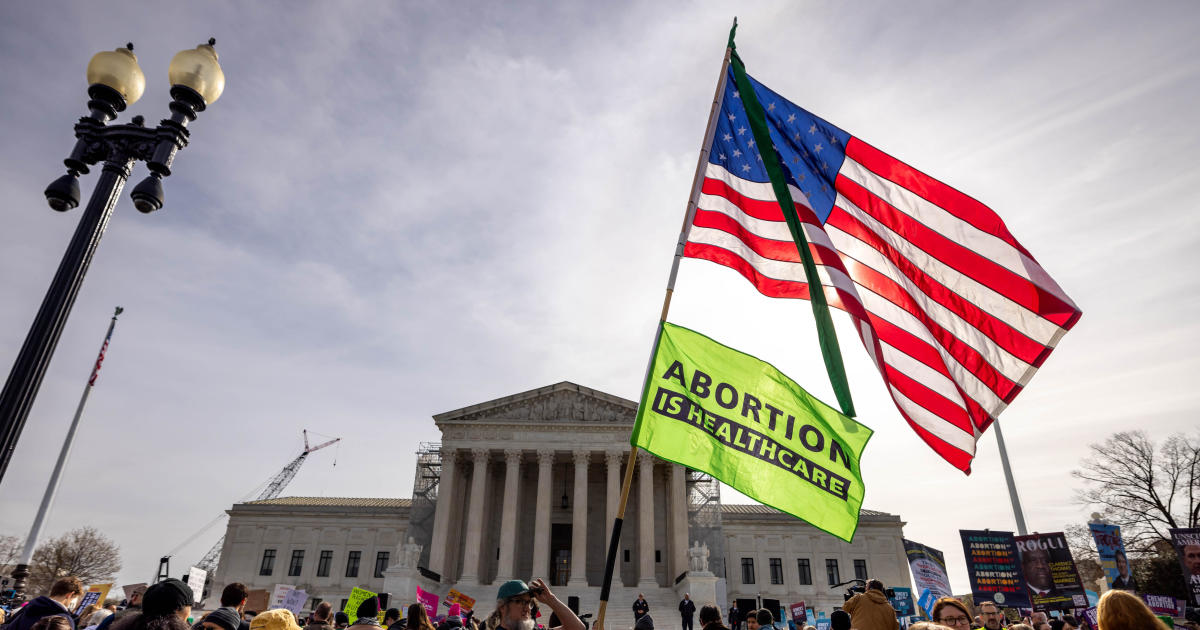Federal appeals court preserves access to abortion pill for now but tightens rules
A federal appeals court has preserved access to an abortion drug for now but under tighter rules that would allow the drug only to be dispensed up to seven weeks, not 10, and not by mail.
The drug, mifepristone, was approved for use by the Food and Drug Administration more than two decades ago and is used in combination with a second drug, misoprostol, to end an early pregnancy. The 5th U.S. Circuit Court of Appeals in New Orleans ruled Wednesday just before midnight.
By a 2-1 vote, a panel of three judges narrowed, for now, a decision by a lower court judge in Texas Friday that had completely blocked the FDA's approval of the drug following a lawsuit by mifepristone's opponents.
The lower court ruling had been on pause for a week to allow an appeal. The Biden administration asked the 5th Circuit on Monday to put the district court's order on hold, calling it "extraordinary and unprecedented."
Under the appeals court order, the FDA's initial approval of mifepristone in 2000 is allowed to remain in effect, as "it appears that the statute of limitations bars plaintiffs' challenges to the Food and Drug Administration's approval of mifepristone in 2000."
But changes made by the FDA since 2016 relaxing the rules for prescribing and dispensing mifepristone would be placed on hold. Those include extending the period of pregnancy when the drug can be used and also allowing it to be dispensed by mail, without any need to visit a doctor's office.
The two judges who voted to tighten restrictions, Kurt Engelhardt and Andrew Oldham, are both appointees of former President Donald Trump. The third judge, Catharina Haynes, is an appointee of former President George W. Bush. She said she would have put the lower court ruling on hold entirely temporarily to allow oral arguments in the case.
The Justice Department said Thursday that it plans to seek emergency relief from the Supreme Court.
White House press secretary Karine Jean-Pierre, in Dublin, Ireland with President Biden, said Thursday the administration would continue its battle for the restoration of full approval of mifepristone. "We believe that the law is on our side, and we will prevail," she said.
In the meantime, Democratic leaders in states where abortion remains legal since the Supreme Court overturned Roe v. Wade last year say they are preparing in case mifepristone becomes restricted.
Democrat-led states have moved to beef up their supplies of the drug and the second pill used for medication abortion, misoprostol, which can be taken on its own to terminate an early pregnancy. But a misoprostol-only medication abortion is slightly less effective — between 80% and 99% — than the two-drug regimen of mifepristone and misoprostol, which is between 95% and 99% effective.
California Gov. Gavin Newsom announced Monday that the state secured an emergency stockpile of up to 2 million misoprostol pills, and Massachusetts Gov. Maura Healy directed health care providers in the state to bank more doses of mifepristone — the University of Massachusetts Amherst purchased roughly 15,000 doses, enough to last the state more than a year, and the doses are set to arrive this week. New York Gov. Kathy Hochul said Tuesday that her state would stockpile 150,000 doses of misoprostol.
Further complicating the legal landscape is a separate decision from a federal district judge in Washington, also issued Friday, that blocked the FDA from altering the status quo regarding to mifepristone's availability in 16 states and the District of Columbia. Those states and D.C. sued the Biden administration in February over a set of restrictions imposed on the drug and sought to preserve access to it.
The Justice Department sought clarification from the Washington court Monday regarding its obligations given the two seemingly-competing district court orders.
Pharmaceutical executives this week also signed a letter that condemned the Texas ruling and warned that FDA approval of other drugs could be at risk if U.S. District Judge Matthew Kacsmaryk's decision stands. There is virtually no precedent for a lone judge overturning the medical recommendations of the FDA.
Twenty-three states and the District of Columbia, as well as Danco Laboratories, which makes mifepristone, supported the Biden administration's request for the 5th Circuit to pause Kacsmaryk's order.
"The decision below is an extreme outlier: No court has ever 'stayed' or 'suspended' the longstanding approval of a drug consistently found safe and effective by FDA," Danco wrote in its own request to the appeals court. "The court's mandatory injunction is an unprecedented judicial assault on a careful regulatory process that has served the public for decades."
The states, meanwhile, warned that curtailing access to medication abortion would result in more abortions occurring later in pregnancy, increasing costs and medical risks. They also warned Kacsmaryk's "unprecedented" decision could have wide-ranging impacts for the FDA.
"The district court's ruling was legally erroneous, undermines the regulatory scheme for drug approvals, and presents devastating risks to millions of people across the country," they said in a filing with the 5th Circuit.
A group of 240 congressional Democrats, including the party's leaders in the House and Senate, also told the 5th Circuit that Kacsmaryk's order halting the FDA's 2000 approval of mifepristone and actions that followed "has no basis in law" and "threatens the congressionally mandated drug approval process."
Congress, they said, designated the FDA "as the expert federal agency with authority to review and approve drug applications, including subsequent changes to those applications. While Congress permitted some judicial review of FDA's approval decisions, it did not invite federal courts to substitute their judgment for the expert conclusions of FDA's scientists."
The lawsuit challenging mifepristone's approval was brought by the Alliance Defending Freedom, which was also involved in the Mississippi case that led to Roe v. Wade being overturned. At the core of the lawsuit is the allegation that the FDA's initial approval of mifepristone was flawed because the agency did not adequately review safety risks.
Mifepristone has been used by millions of women over the past 23 years, and complications from mifepristone occur at a lower rate than problems in wisdom teeth removal, colonoscopies and other routine procedures, medical groups have recently noted.
The FDA made several changes to the rules surrounding the abortion pill since its initial green light, including approving a generic version of mifepristone in 2019 and lifting a requirement that the pills be dispensed in-person in 2021, allowing the drug to be prescribed by a provider during telemedicine appointments and sent by mail.
Medication abortions accounted for more than half of the abortions in the U.S. in 2020, according to the Centers for Disease Control and Prevention, and the Biden administration told the 5th Circuit that serious adverse events are rare when mifepristone is used as directed by the FDA. More than 5 million women have take mifepristone since 2000, and only 28 deaths were reported through June 2022, though some were associated were "obvious alternative causes" unrelated to use of the abortion pill, according to the FDA.
"The court upended the status quo with its abrupt and sweeping nationwide order," the Biden administration said in seeking a stay of Kacsmaryk's ruling. "If allowed to take effect, that order will irreparably harm patients, healthcare systems, and businesses.



